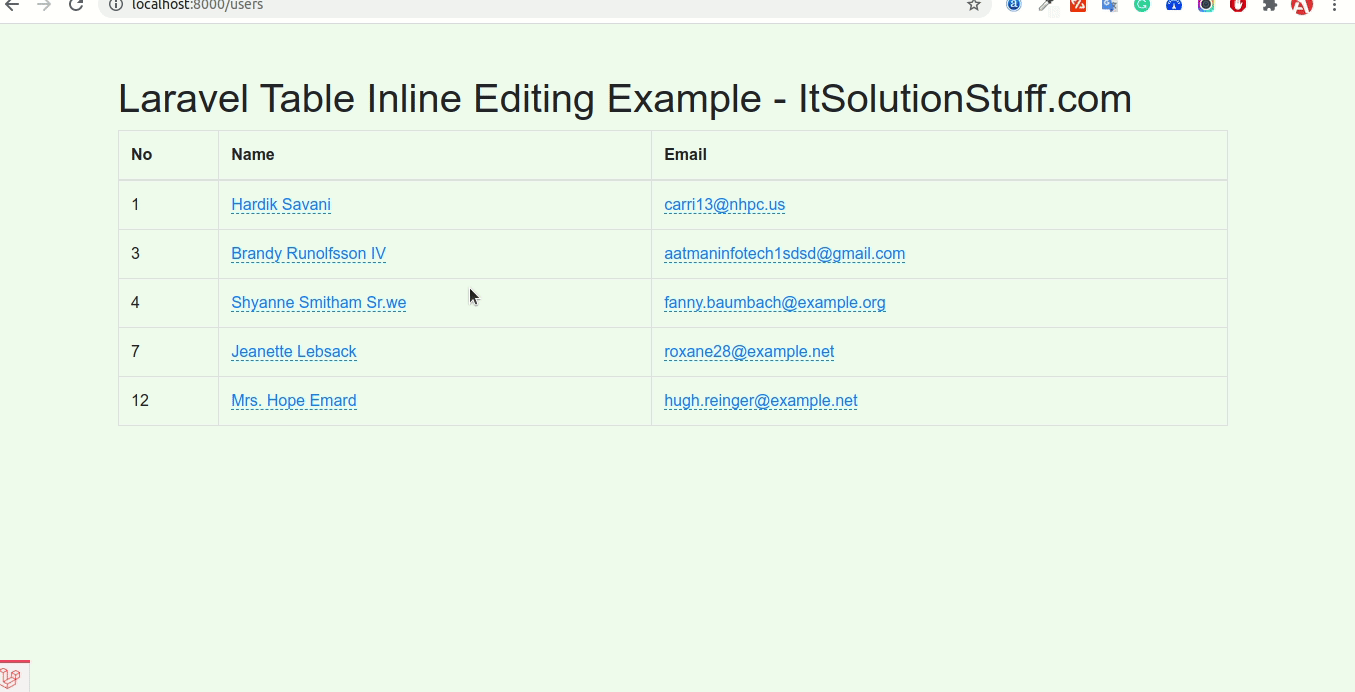Hello,
This post will give you example of laravel table inline editing. you will learn laravel inline editing. This tutorial will give you simple example of laravel ajax inline edit. Here you will learn laravel x-editable example.
In this tutorial i will show you how to simple example of how create table inline editing in laravel app. you can use this example with laravel 6, laravel 7, laravel 8, laravel 9 and laravel 10 version.
in this example, we will display list of users and you can edit his name and emails using x-editable js, so let’s see bellow image follow bellow step.
Preview:

Step 1: Install Laravel
first of all we need to get fresh Laravel 8 version application using bellow command, So open your terminal OR command prompt and run bellow command:
composer create-project --prefer-dist laravel/laravel blog
Step 2: Add Dummy Users
In this step, we need to create add some dummy users using factory.
php artisan tinker
User::factory()->count(10)->create()
Step 3: Create Route
In this is step we need to create some routes for add to cart function.
routes/web.php
<?php
use Illuminate\Support\Facades\Route;
use App\Http\Controllers\UserController;
/*
|--------------------------------------------------------------------------
| Web Routes
|--------------------------------------------------------------------------
|
| Here is where you can register web routes for your application. These
| routes are loaded by the RouteServiceProvider within a group which
| contains the "web" middleware group. Now create something great!
|
*/
Route::get('users', [UserController::class, 'index'])->name('users.index');
Route::post('users', [UserController::class, 'update'])->name('users.update');
Step 4: Create Controller
in this step, we need to create UserController and add following code on that file:
app/Http/Controllers/UserController.php
<?php
namespace App\Http\Controllers;
use Illuminate\Http\Request;
use App\Models\User;
class UserController extends Controller
{
/**
* Display a listing of the resource.
*
* @return \Illuminate\Http\Response
*/
public function index(Request $request)
{
$users = User::paginate(10);
return view('users', compact('users'));
}
/**
* Write code on Method
*
* @return response()
*/
public function update(Request $request)
{
if ($request->ajax()) {
User::find($request->pk)
->update([
$request->name => $request->value
]);
return response()->json(['success' => true]);
}
}
}
Step 5: Create Blade Files
here, we need to create blade files for users, products and cart page. so let’s create one by one files:
resources/views/users.blade.php
<!DOCTYPE html>
<html>
<head>
<title>Laravel Table Inline Editing Example - ItSolutionStuff.com</title>
<meta name="csrf-token" content="{{ csrf_token() }}">
<link rel="stylesheet" href="https://cdnjs.cloudflare.com/ajax/libs/twitter-bootstrap/4.1.3/css/bootstrap.min.css" />
<script src="//ajax.googleapis.com/ajax/libs/jquery/1.11.3/jquery.min.js"></script>
<link href="//cdnjs.cloudflare.com/ajax/libs/x-editable/1.5.0/jquery-editable/css/jquery-editable.css" rel="stylesheet"/>
<script>$.fn.poshytip={defaults:null}</script>
<script src="//cdnjs.cloudflare.com/ajax/libs/x-editable/1.5.0/jquery-editable/js/jquery-editable-poshytip.min.js"></script>
</head>
<body>
<div class="container">
<h1>Laravel Table Inline Editing Example - ItSolutionStuff.com</h1>
<table class="table table-bordered data-table">
<thead>
<tr>
<th>No</th>
<th>Name</th>
<th>Email</th>
</tr>
</thead>
<tbody>
@foreach($users as $user)
<tr>
<td>{{ $user->id }}</td>
<td>
<a href="" class="update" data-name="name" data-type="text" data-pk="{{ $user->id }}" data-title="Enter name">{{ $user->name }}</a>
</td>
<td>
<a href="" class="update" data-name="email" data-type="text" data-pk="{{ $user->id }}" data-title="Enter email">{{ $user->email }}</a>
</td>
</tr>
@endforeach
</tbody>
</table>
</div>
</body>
<script type="text/javascript">
$.fn.editable.defaults.mode = 'inline';
$.ajaxSetup({
headers: {
'X-CSRF-TOKEN': '{{csrf_token()}}'
}
});
$('.update').editable({
url: "{{ route('users.update') }}",
type: 'text',
pk: 1,
name: 'name',
title: 'Enter name'
});
</script>
</html>
Now we are ready to run our example so run bellow command so quick run:
php artisan serve
Now you can open bellow URL on your browser:
localhost:8000/users
i hope it can help you…




